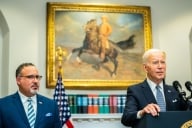You have /5 articles left.
Sign up for a free account or log in.
In 2004, the U.S. government tightened regulations on academic travel to Cuba, precipitating dramatic declines in the number of U.S. college students studying abroad there. The Center for Cross-Cultural Study (CC-CS), an Amherst, Mass.-based study abroad provider, was one of many entities that subsequently suspended its Cuba-based programs.
But its pre-2004 activities remained of interest to the federal government. Last month, CC-CS entered into a $15,000 settlement with the U.S. Treasury Department’s Office of Foreign Assets Control regarding allegations that its role in running study abroad programs as a subcontractor of sorts -- acting "on behalf of various licensed U.S. colleges and universities” -- violated federal restrictions on relationships with Cuba then in place.
A Treasury Department spokesman declined to comment on the settlement beyond a blurb published Monday. Jerry Guidera, U.S. director for CC-CS, said that the case stemmed specifically from the provider’s partnership with Willamette University, in Oregon (Willamette was not involved with the legal dispute, he said).
According to Guidera’s account, Willamette held the necessary license from the Treasury Department to sponsor academic programs in Cuba, but, from 1997-2004, CC-CS designed the academic program and handled program logistics on behalf of Willamette. CC-CS hired Cuba-based staff and wired funds.
It was when the government blocked an attempted wire transfer, intended to cover program costs, in January 2004 -- the Treasury Department says the settlement covers alleged violations form March 2003 to January 2004 -- that Guidera said CC-CS came under governmental scrutiny.
“We’ve been dealing with this for almost five years now,” said Guidera, who added that the statute of limitations on the alleged violations is set to expire soon and that, in reaching the settlement, there was no finding of fault. He believes the regulations then in place allowed for subcontractors to act on licensees' behalf. “We’re convinced that we would have won in court."
“If we had infinite resources we would have kept fighting this one forever.”
Other study abroad sponsors have paid fines to the Treasury Department in the past due to allegations that they, or entities they did business with, lacked the licenses required to support academic travel in Cuba. Those fines, like the one against CC-CS, related primarily to pre-2004 activities, however, and since then, the number of colleges even attempting to offer study abroad programs in Cuba has dropped to “as many as 12,” down from several hundred, according to Wayne Smith, an adjunct professor at Johns Hopkins University and a senior fellow at the Center for International Policy, where he directs the Cuba program.
Institute of International Education data show a drop in the number of U.S. students in Cuba from 2,148 in 2003-4 to 140 in 2005-6, the latest year for which estimates are available.
As a Johns Hopkins adjunct, Smith has been unable to teach in Cuba for the university. In addition to stipulating that study abroad programs in Cuba be no shorter than 10 weeks, the September 2004 regulatory changes limited licensed, accredited colleges to running Cuba-based programs involving only their own students and their own full-time employees.
A judge rejected a legal challenge to the 2004 regulatory changes filed by the Emergency Coalition to Defend Educational Travel; the case is now under appeal in the U.S. Court of Appeals for the District of Columbia, said Smith. He expects a decision by the end of the year, but predicted that if Sen. Barack Obama wins the presidency today, there will be a move toward removing restrictions on academic travel regardless. (Obama’s Web site states: "[I]f a post-Fidel government takes significant steps toward democracy, beginning with freeing all political prisoners, the U.S. is prepared to take steps to normalize relations and ease the embargo that has governed relations between our countries for the last five decades.”)
For CC-CS’s part, “The monkey is off our back,” Guidera said of the end to litigation.
More broadly speaking, the provider considers its academic programs in Cuba to be “temporarily suspended.”
A statement from CC-CS reads, “We remain committed to academic programming in Cuba and are prepared to return to Cuba when U.S. regulations allow for such programs.”








